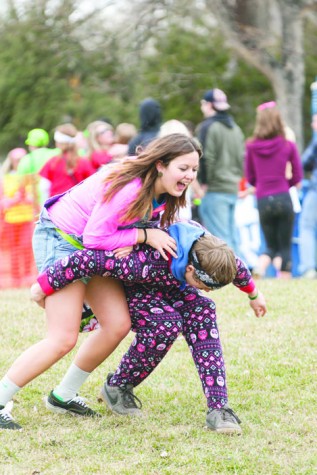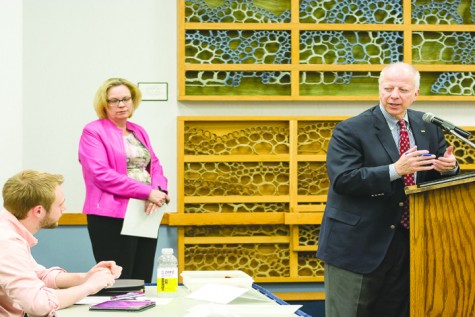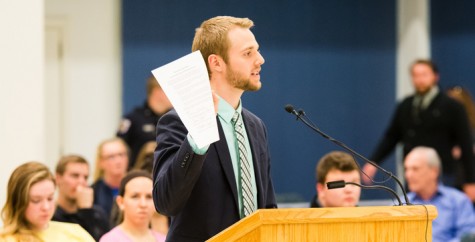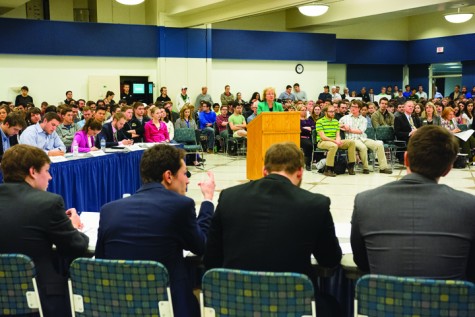City considers passing new drinking laws
Proposed legislation aims to increase alcohol-related penalties. Photo Courtesy of thenextcorner.net.
Grand Forks could have new legislation proposed to the city council in the coming months, as the Community and Campus Committee to Reduce High-Risk Alcohol Use is working on writing up three new ordinances. The ordinances are in the very beginning stages of their construction but are focused on the committee’s main goal of providing a safe community.
The CCC was established in 2013 after presentations from two national speakers, including Linda Major from Lincoln, Neb. Major spoke about work being done at the city level to keep the community safe, including ways to discourage high-risk alcohol use.
“That prompted us to establish a high-level group, or task force to look at these issues,” Vice President for Student Affairs Lori Reesor said.
Mayor Michael Brown and UND President Robert Kelley came together to form the group, which is made up of school administrators, UND student body representatives, Grand Forks public school representatives, hospitality industry representatives and other members of the community.
After months of research, the CCC came up with 10 to 12 ideas they wanted to address in the community. Of these, four were picked as the ideas the committee would focus on first.
One of these ideas is implementing a social host ordinance, which would hold landowners or homeowners accountable if individuals under the age of 21 were found to be drinking on the property.
“Some parents think that it is OK to let high school students drink at home, and in some ways that is true,” Reesor said. “But there was an incident in Minnesota last year like that, and it led to a high school student’s death. This would create consequences for parents.”
But, depending on how the ordinance would be worded, it could cause problems for other people.
“What if some kids go out on a piece of field to drink, and the landowner doesn’t know they are there?” City Council Member Terry Bjerke said. “Or in an apartment complex? Those people can’t be there 24/7. I would need to see the language, because there are many ways you can write these.”
Another issue the CCC is looking at is a public intoxication ordinance. Grand Forks has a disorderly conduct ordinance, but this would give law enforcement a different way of prosecuting intoxicated individuals.
“We want to explore and provide all options for law enforcement,” Reesor said. “The law doesn’t have to be used, but to provide accountability.”
The third issue is an extreme drink special ordinance, which would limit drink specials, such as 3-for-1s or the number of those specials that could be purchased.
Along with the ordinances being considered, the CCC says it is taking a holistic approachto find new ways to educate the community and offer alternatives to high-risk drinking situations. Student Body President Tanner Franklin is looking at offering alternative choices on the day of Springfest to give students new options.
“This isn’t prohibition, it’s about high-risk drinking,” Reesor said. “We are targeting high-risk alcohol use. The law says you have to be 21 to drink, so if you have one beer at 19, that might not be a health risk, but it could be a career or life risk. We want to keep students safe, and have them make good choices.”
The CCC is currently working with city attorney Howard Swanson on the wording of the ordinances to find gaps in the current laws as well as make sure the new propositions don’t overlap or contradict current laws.
Once the ordinances are written, they go to the Service Safety Committee, made up of three city council members, including Bjerke. If approved by the committee, they would then go to the council for consideration.
“The debate is a good one,” Bjerke said. “We need to look at what’s on the books now and does it make sense.”
Reesor said UND has used this committee to find new ways to address high-risk alcohol use internally.
“We have been educated about things we could be doing differently,” Reesor said. “Students need to be aware, they need to be educated about the consequences, they need to make sound decisions and they need to take care of each other.
“I’m not there on Friday or Saturday nights, so students need to be taking care of their friends. If that means telling them to stop, or eat before they go out, or knowing what to do when someone is passed out, so people can be safe.”
Megan Hoffman is a staff writer for The Dakota Student. She can be reached at megan.hoffman@my.und.edu.











